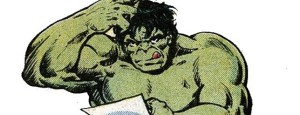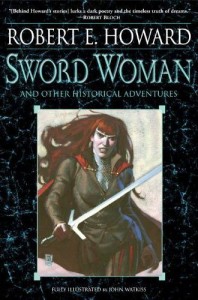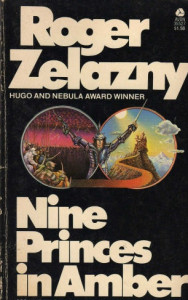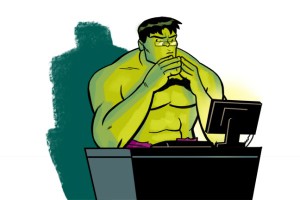Character Design, Part 3: Character Voice
 The other day my friend Mick swung by the site and asked if I had any advice about character design. Specifically, he was curious about how I: “find a character’s voice to begin with? Just feel it out? Or focused, prescribed exercises?”
The other day my friend Mick swung by the site and asked if I had any advice about character design. Specifically, he was curious about how I: “find a character’s voice to begin with? Just feel it out? Or focused, prescribed exercises?”
I’ve offered advice about character creation before (here, where I discuss character design, here, where I added an addendum, and here, where I talk about loving your character.) But looking over all of that I see that I’ve never really discussed how I find a character voice. Everything I’ve written about is advice to use AFTER that point.
So I gave the matter some thought. I’m not sure how other writers do it, or what works for them, but I can tell you what works for me.
 A lot of my characters are based from figures from books or movies or historical figures whom I respect or admire. (I almost always start with heroes and then design enemies to oppose them.)
A lot of my characters are based from figures from books or movies or historical figures whom I respect or admire. (I almost always start with heroes and then design enemies to oppose them.)
I’ve written that I could hear Asim’s voice, from my historical fantasy series, very clearly. Well, that’s because I’d been reading a slew of Harold Lamb stories for years, but most likely because I’d just re-read Robert E. Howard’s historical story, one of my very favorites by him, “The Road of Azrael” (found most easily these days in the Del Rey anthology Sword Woman).
Asim began as a riff off of Robert E. Howard’s wonderful narrator to that particular story. He ended up becoming different, but that was the starting point. And you could say that Dabir is a kindler, gentler, not as infallible version of Sherlock Holmes through an Arabian lens. (Basically I removed the parts about Sherlock Holmes that had always irritated me a bit and made Asim much more of a partner than Watson ever was.)
 My current work is hugely influenced by my all-time favorite fantasy series, Roger Zelazny’s original Chronicles of Amber. I always loved the characters of Corwin and Benedict, the first being the flawed, dark hero of the series and the second his older brother, the noble, haunted, genius strategist and tactician. Well, two of the characters in the series-in-progress began as riffs on them, but shifted though my own lens, first because I don’t want to write pastiche, second because I can’t write like Roger Zelazny, third because I have a different tale to tell. (There are probably fourth and fifths to boot.)
My current work is hugely influenced by my all-time favorite fantasy series, Roger Zelazny’s original Chronicles of Amber. I always loved the characters of Corwin and Benedict, the first being the flawed, dark hero of the series and the second his older brother, the noble, haunted, genius strategist and tactician. Well, two of the characters in the series-in-progress began as riffs on them, but shifted though my own lens, first because I don’t want to write pastiche, second because I can’t write like Roger Zelazny, third because I have a different tale to tell. (There are probably fourth and fifths to boot.)
In my series-in-progress, the character who started out being Corwinesque still has some of Corwin’s madness and selfishness, his appetites and instinct for self-destructive acts, but coming as he does from a more supportive background, he’s kinder and more dedicated to others. My take on Benedict is less removed from the people around him and far more involved in the story (as a matter of fact, he’s become my wife’s favorite character in the first book). I think most fans of Amber wanted to see much more of Benedict, so the guy who started out as a shadow of him in my own tale gets a lot more screen time.
Another character in said book is loosely based on what I’d imagine James Bond as portrayed by young Sean Connery would have been like as he launched his career.
In short, then, I start with characters who interest me from other places, twist them around a little so they become mine, and throw them together despite disparate origins. Just tossing in characters inspired from different sources changes things up right away.
 Once I have THOSE people I can start creating other characters who bounce off of them. A lot of them are no longer riffs — it’s almost as though once I have a few notes going it’s easier to improvise, if that makes sense. For instance, the central protagonist, a woman named Elenai, isn’t based on anyone in particular, although she certainly has some characteristics in common with my wife and other heroic women. As I’ve mentioned in the third essay linked above, I actually had trouble finding her voice, because I incorrectly wrote her as too young and inexperienced. When I recast her with greater intelligence right from the get-go, someone just on the cusp of greatness, she, and the story, really began to gel.
Once I have THOSE people I can start creating other characters who bounce off of them. A lot of them are no longer riffs — it’s almost as though once I have a few notes going it’s easier to improvise, if that makes sense. For instance, the central protagonist, a woman named Elenai, isn’t based on anyone in particular, although she certainly has some characteristics in common with my wife and other heroic women. As I’ve mentioned in the third essay linked above, I actually had trouble finding her voice, because I incorrectly wrote her as too young and inexperienced. When I recast her with greater intelligence right from the get-go, someone just on the cusp of greatness, she, and the story, really began to gel.
Mick, I hope that helps, and I hope this essay will be helpful to other writers as well. Please, if anyone else has writing craft questions, don’t hesitate to drop me a note. And believe me, I’m still figuring this out as I go, so if anyone has useful advice, we’d all love to hear it
0 Comments